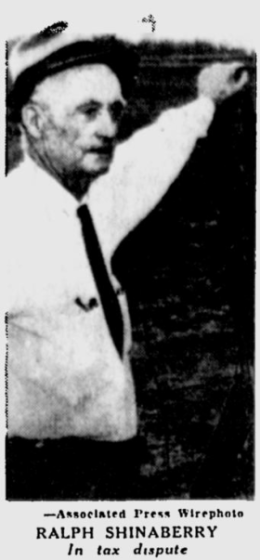Farmers Help Tax Rebel Keep Land Near Hillsdale
Fellow Grocer Gets Bidding On Lien Down To Fractional Part Of Value
Hillsdale, Mich., (AP)
Fellow farmers came to the aid of tax rebel Ralph Shinaberry and helped him keep his farm in a tax sale.
“I have no intention of taking possession of the property,” said Herbert Jessup who was the winning bidder at the auction of the 68-year-old rebel’s farm.
Mr. Jessup was one of about 20 farmers who attended the sale and forced out other bidders by competing for Mr. Shinaberry’s $22,000 farm which was being auctioned off in a $310 tax sale.
The bidding continued until payment of the tax would give a lien on 1/264th part of the 250-acre farm.
“I just happen to believe a man should have a little freedom with what he does with his own property,” explained Jessup.
Could Get Title
If Mr. Shinaberry does not pay his tax by , Mr. Jessup will get a deed for the portion of land he won.
If another six months elapse and Mr. Shinaberry still has not paid, Mr. Jessup will get clear title to 1 264th portion.
Mr. Shinaberry’s farm is some 33 miles southeast of this southern Michigan community.
Mr. Shinaberry has worked his farm for 33 years.
He has refused to pay a government penalty for planting one acre of wheat too much in , but the tax auction was held to satisfy a county tax claim against the land.
Mr. Shinaberry also has refused to pay the tax.
He contends that if the government controls his use of his land, then he does not really own it.
“They want to take it over,” he said, “so let them pay their own taxes for it.”
Mr. Shinaberry didn’t show up for the auction.
He owns 150 acres which he operates with his son, Max, 21, but 30 acres is tax-exempt under Michigan’s veterans’ homestead exemption act.
Mr. Shinaberry started his row with the Federal Government in .
Fights Losing Battle
He said he refused to pay because “I don’t believe the Government can tell me how much I can grow.”
He has fought a losing battle in federal courts thus far on that score.
Mr. Shinaberry and the Federal Government locked horns on wheat acreage allotments about the same time that Stanley Yankus, Dowagiac, Mich., and federal authorities began a battle on the same issue that ended with Mr. Yankus selling his farm and moving to Australia.
The Hillsdale farmer says that if he loses his farm for taxes or for his rebellion against paying federal assessments, he’s going to hook a car to a house trailer he owns and go about the country broadcasting from loudspeakers to all who will listen, his argument against federal control of what farmers may grow.
Shinaberry pulled some other stunts in his day. At one point, the government fined him for raising wheat on 28 acres when his allowed quota was nine acres. He refused to pay his fine, the government put a lien on his crop, and so Shinaberry refused to sell it. Most of it rotted while he pursued in the courts his right to grow as much wheat as he’d like on his own damn farm, and the rest he personally delivered to the Agriculture Stabilization Commission along with a bill.


